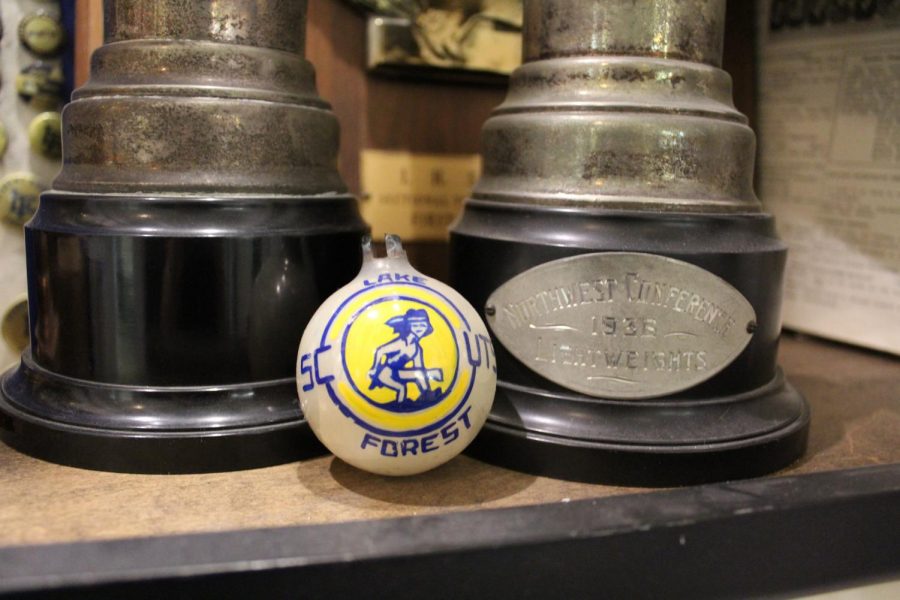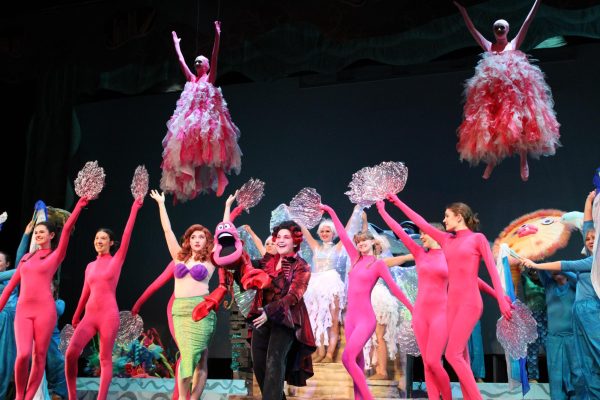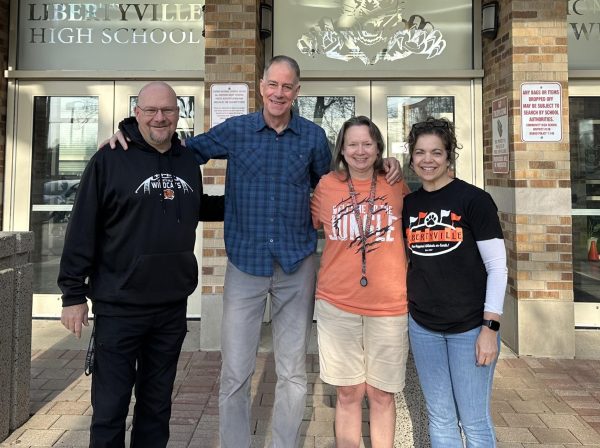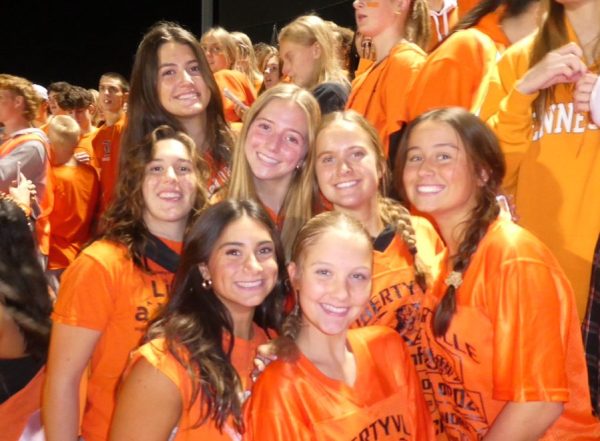More Than a Mascot: The debate surrounding Native American mascots in the U.S.
The “Scout” mascot has been a part of the school’s image for a long time; pictured above is a display showing historical school-related artifacts including trophies from the 1930’s and an antique hand painted ornament.
At Libertyville High School, students often identify as “the Wildcats.” When students and community members attend football games, assemblies, and everything in between, fans rally behind the famous “Willie the Wildcat.” LHS’ mascot is, as some may say, beloved.
However, in some areas, the love for one’s mascot may be more controversial.
In fact, according to MascotDB, an online database that collects information on American sports teams from the high school to professional levels, approximately 2,129 sports teams are represented by some form of a Native American mascot.
These teams vary all the way from the NFL’s Kansas City Chiefs to Lake County, Illinois’ Lake Forest Scouts. Whether it’s support from an avid fan or opposition from a concerned protester, it is evident that today in the United States, such sports symbols are far more than just mascots.
The Lake Forest Scouts
Brynne Martin, a senior at Lake Forest High School in Lake Forest, Illinois, explained that most games at LFHS host hundreds of students sporting their blue and gold spirit wear as they cheer “Go Scouts!” from the bleachers. As she explained, many students don’t reveal any concern in regards to LFHS’ mascot. However, Martin is quite angered by the display.
“Our mascot is culturally insensitive,” Martin critiqued. “A lot of [students] try to ignore the fact that it is very racist and I think that it hinders the school spirit as a whole.”
Despite her concern that students ignore the racism behind the Lake Forest Scouts moniker, Martin is not the only student angered by their school’s mascot. Emma Johnson, another senior at LFHS, is equally outraged and specified that the “Scout” is far more than just a high school mascot.
“Having Native American mascots, especially a caricature like the Scouts, perpetuates a lot of stigma surrounding the Native American communities [who are] already oppressed,” explained Johnson.
Johnson and Martin both went on to emphasize that the use of such mascots exploits Native Americans across the U.S. because, from their personal experiences, the schools with such mascots are rarely ever comprised of many Native American students.
“Because our school is so Caucasian, 86 percent to be exact, [students] don’t care that much about the minorities. It seems like minorities are not very represented here,” Martin said.
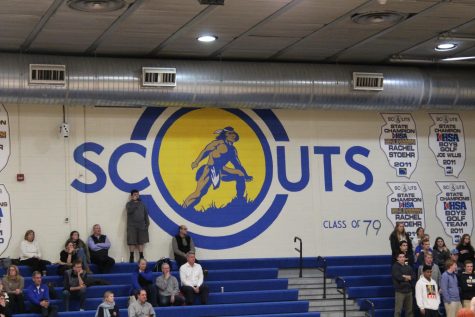
A mural of Lake Forest High School’s mascot, the Scouts, is still emblazoned on on the wall of the main gym where it was painted in 1979.
A senior from Lake Forest High School, who identifies as Cherokee, disagreed with the sentiment that the mascot is culturally insensitive to him personally; he requested anonymity while commenting on the subject because the LFHS administration discouraged students from speaking about the subject.
“I don’t really care at all. I view [the Scouts] as any other mascot, to be perfectly honest with you. It’s like how Libertyville [is] ‘the Wildcats,’ here [at LFHS] it’s the same thing. I don’t really view it any differently than that,” he explained.
Our publication contacted the LFHS principal, athletic director and the District 115 superintendent, who all refused to comment on the subject.
High schools with Native American mascots like LFHS are not uncommon, according to MascotDB; in fact, of all the high schools in its database, 8.2 percent have Native American team names.
However, some high schools have changed their Native American mascots due to concerns similar to the aforementioned displeasure expressed by Martin and Johnson. The teams at Niles West High School in Skokie, Illinois, were once known as the Niles West Indians, but the school decided to change their mascot to the Niles West Wolves about 18 years ago.
Dr. Jason Ness, the current principal at NWHS, was not the principal during the change in mascots, however he explained the history in regards to their mascot change in a phone interview.
“[Niles West High School] was probably one of the first schools to make the [mascot] change… It was really a student-led process. The students brought their concerns to the administration about the name and whether or not it was hurtful to certain groups of people,” described Dr. Ness. “Niles West is a very diverse school and the feeling was that the [mascot] was disrespectful; therefore, a change happened in joint effort with students and the administration.”
While both Martin and Johnson noted that not many students discuss the effects of their mascot, they emphasized how a change in the mascot would be beneficial for the community.
“A mascot change could shift our mascot from appropriation to respect,” concluded Johnson.
Mascots in Professional Sports
Chicago Blackhawks, Washington Redskins, Cleveland Indians, Atlanta Braves — all of these mascots are representations and depictions of Native Americans for major sports teams across the U.S. These mascots are not just limited to specific sports, nor regions of the country, as a hockey team in Chicago and a baseball team in Atlanta have Native American mascots representing them.
Ethan Neir, a senior at Libertyville High School, is an avid fan of hockey, specifically following the Chicago Blackhawks. When asked about the potential offensiveness behind the Native American mascot, Neir explained, “I think that there’s a difference with teams like the Blackhawks, who I don’t think are in any way villainizing Native Americans. A lot of times they’ll bring members from these Native American [tribes] out onto the ice with veterans; and the mascot that they have, Tommy Hawk, isn’t really in any way tied to Native Americans.”
However, Native American mascots can be harmful to many indigenous tribes, according to the American Psychology Association. In fact, in a psychological report presented by the APA in 2005, Dr. Stephanie Fryberg from the University of Arizona highlighted that Native American mascots, on both regional and national platforms, have a negative impact on the self-esteem of American Indian children.
“American Indian mascots are harmful not only because they are often negative, but because they remind American Indians of the limited ways in which others see them. This, in turn, restricts the number of ways American Indians can see themselves,” Dr. Fryberg expressed in the report.
In regards to the sentiments previously mentioned by both Neir and the anonymous LFHS senior, some individuals do find specific mascots more racist than others. According to Dr. Martin Cutler, Dr. Mary Pritchard and Shae Hart of Boise State University, one of the most controversial mascots in professional sports is the Washington Redskins. “Redskin,” defined as a racial slur for indigenous peoples according to the Oxford Dictionary, was described to be a racist mascot by 54.3 percent of the respondents in the BSU study.
Neir, Martin and Johnson all expressed their agreement with that notion and further emphasized the racist slur that the specific “Redskin” mascot represents.
“A ‘Redskin’ is specifically a racial slur … Both the ‘Redskins’ and the ‘Indians,’ those are pretty blatantly offensive, and I think those should be changed because of that blatant offensiveness,” Neir expanded.
In fact, the Cleveland Indians, a team in Major League Baseball, is changing the version of their logo that is a cartoon depiction specifically because of its racist connotations; the team is keeping its nickname, however. In a statement published in The New York Times, the commissioner of MLB, Rob Manfred, explained that the Cleveland Indians “ultimately agreed with my position that the logo is no longer appropriate for on-field use in [MLB].”
Furthermore, it’s important to note that a day after Cleveland’s announcement in regards to their change, NFL commissioner Roger Goodell explained that he did not see the Washington Redskins’ nickname changing, according to ESPN.
When explaining his overall sentiments discussing Native American mascots, the senior of Cherokee descent from LFHS concluded, “I’m not really offended by [Native American mascots]. As long as it’s used respectfully, I think it’s fine. It’s kind of like a tribute to [Native Americans].”
In his final thoughts, Neir noted how his view on racist mascots could be subject to change. “I don’t feel [some mascots] are offensive, but also, it’s not me,” he emphasized. “If there is something culturally that I’m missing but they included in there, and I don’t notice because I wouldn’t know any better, I completely understand.”



